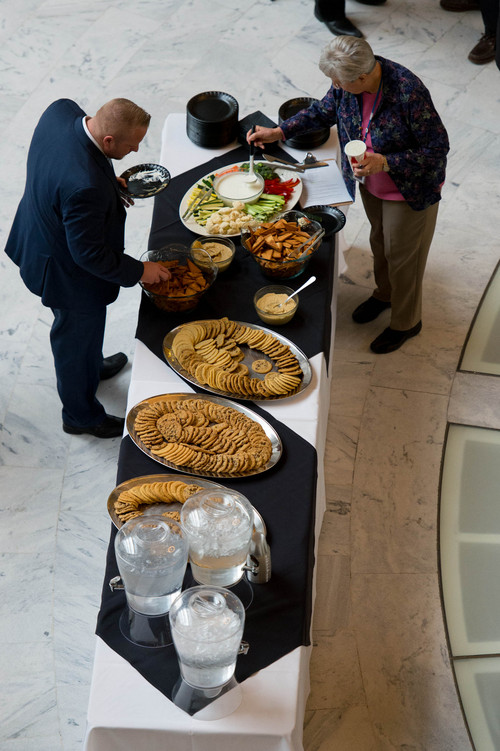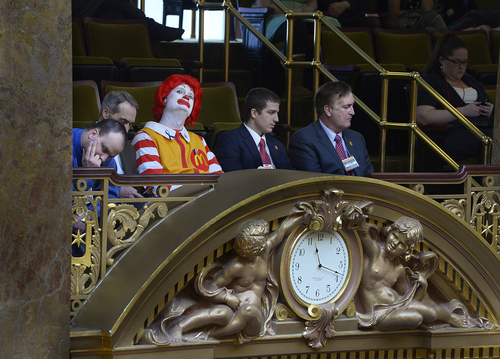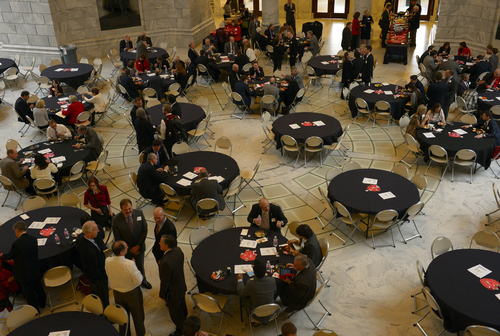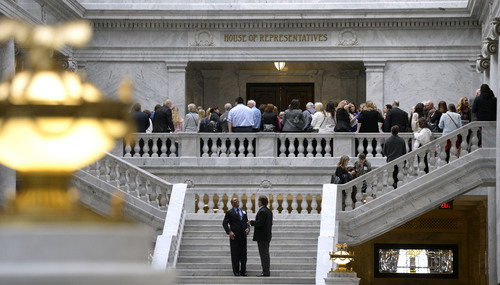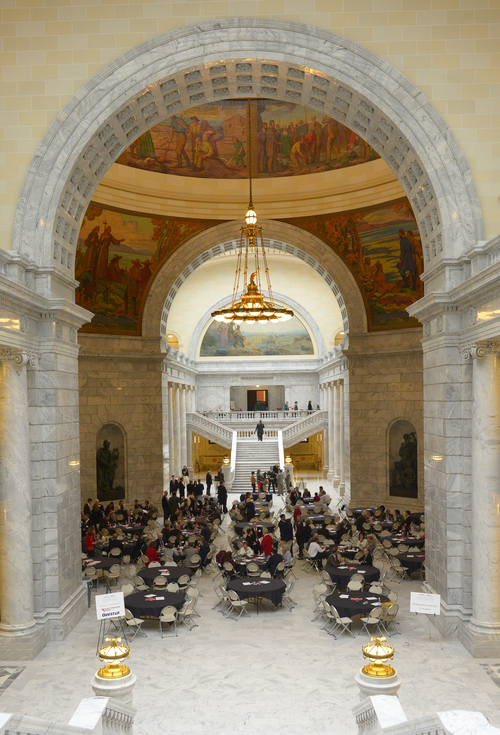This is an archived article that was published on sltrib.com in 2014, and information in the article may be outdated. It is provided only for personal research purposes and may not be reprinted.
Last year, Utah legislators tweaked their pay structure and ended what proved to be something of a financial incentive to gobble free meals offered by special interests.
With that change, the number of such free-food events decreased this year — but only by 10 percent, with 93 of them still scheduled for the 45-day session.
While freebies remain a popular way to attract lawmakers to hear lobbying pitches, they appear to be changing. The number of free lunches — which are expensive for sponsors — dropped by nearly half this year. Less-costly receptions nearly doubled.
"That may be a result of what's going on" with pay changes, said Senate Majority Leader Ralph Okerlund, R-Monroe. "Sponsors have to weigh the cost versus how many people they can get" and catered lunches are expensive. "Members are always very busy," so he acknowledges that fewer may attend lunches with financial incentives gone.
Still, special interests don't see free wining and dining disappearing any time soon. That's too bad, say groups who can't afford that style of lobbying.
—
Incentives • Until last year, lawmakers received a $61 daily allowance from the state for meals during the session. Lawmakers treated to free meals could pocket the money, no questions asked.
In fact, most lawmakers considered the meal allowance part of their regular pay. But then their base salary was raised and now meal expenses can be reimbursed for actual cost, based on receipts submitted.
"I think the way the salary is now, it actually improves the system" and gives wealthier special interests a bit less influence, said Maryann Martindale, director of the reform-seeking Alliance for a Better Utah.
Last year, special interests scheduled 103 events. It dropped to 93 this year.
But the number of free group lunches declined from 32 to 17 during the Legislature's 33 workdays, thanks largely to the Senate Republicans ending the practice of allowing special-interest groups to pay for their twice-a-week caucus lunches. At the same time, the number of evening receptions increased from 13 to 22.
Until four years ago, laws required groups to disclose how much they spent on meals and treats for legislators. But then a law restricting gifts created a big loophole. Disclosure is required when a lobbyist takes a legislator or a small group of lawmakers out, but no reporting is required when the lobbyist or group invites all legislators, or all members of a committee, to an event.
So while the actual spending on such freebies is now a mystery, The Salt Lake Tribune compiled a partial list of the events and their sponsors using legislative social calendars, obtained through open-records requests.
—
Events • This year, the Senate is being offered at least 12 breakfasts, 17 lunches, 10 dinners, 25 snack breaks, 20 receptions and five family events.
The House is being offered 11 breakfasts, 16 lunches, nine dinners, 25 snack breaks, 22 receptions and five family events.
Events ranged from a snack break with food from McDonalds, including a visit from Ronald McDonald, to a dinner and a show at the Hale Center Theatre featuring its production of "Les Miserables."
Not surprisingly, groups that offer events often look for something in return.
For example, The Leonardo museum held an event Feb. 21 for legislators and their families to see its exhibit of the Dead Sea Scrolls. Meanwhile, the organization has requested $750,000 in state funds this year.
Clark Planetarium held a family event on Feb. 10. It is seeking $1 million in state funds. The Natural History Museum of Utah had a family event on Feb. 3, and it has asked for $380,000 in state money.
Zion's Bank and the Sundance Institute also have scheduled a dinner and a movie night. The Sundance Film Festival is looking for an appropriation of $750,000.
Nineteen health-care industry groups sponsored free events this year, the most by a broad interest group. There are at least 52 bills related to that industry before the Legislature this session, not to mention the big budget battles over Medicaid and other appropriations affecting them.
Some of those groups included the American Heart Association, Huntsman Cancer Institute, Johnson & Johnson, Utah Association of Health Underwriters, Utah Health Plans, Utah Hospital Association, Utah Medical Association and the Utah Pharmacists Association.
Meanwhile, the Legislature considered at least 97 bills on education. Among education groups sponsoring events were the PTA, Parents for Choice in Education, the Utah Christian Home School Association, the Utah Education Association teacher's union and the Utah School for the Deaf & Blind.
—
Effects • Lincoln Shurtz is a lobbyist for the Utah League of Cities and Towns, which held a lunch for legislators with mayors from around the state.
"It's easier to get 104 people [the number of Utah legislators] in one place versus trying to find individuals 104 times" to explain cities' priorities and concerns, Shurtz said.
"Because we are political subdivisions of Utah, we see ourselves as partners with the state .… We use this as an opportunity to say there are things important to local governments."
Okerlund, the Senate majority leader, says about such events: "It's nice for them to get a bunch of legislators at the same time. It's also nice for me to do something during the lunch hour to get some business done and learn what the issues are."
But groups without money to treat lawmakers say it makes them the underdogs.
"We are definitely at a disadvantage, all of us who are citizens up here because we have to stand out in the hall, send in notes and try to catch people one at a time," said Ron Mortensen, an activist on immigration and tax issues.
He does take advantage of others' free events, however. "We stand around the receptions and catch members as they come and go to them."
He adds, "It's not that free meals are corrupting anybody, but it's providing access."
Martindale, with Alliance for a Better Utah, says free events mean sponsors "have a captive audience" for a half-hour or more. She says when she can convince a lawmaker to meet her in a hallway, it's noisy, full of distractions "and we may have just a couple of hurried minutes."
Okerlund says lawmakers want to hear all views and make an effort to do so.
"I try to make myself accessible and probably who I am most interested in hearing are constituents from my district," he said. But, "Really anybody who wants to come in and visit, we try to set up a time even if it's only 10 minutes. But that's the same we give the highest-paid lobbyists — 10 minutes."
Even with financial incentives gone from the pay changes, most see free events continuing because there are benefits on both sides of the interaction.
"I don't see it changing," Martindale said.


